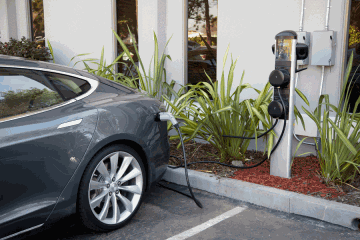 Electric vehicles have sparked interest among many Canadian car consumers, igniting a significant increase in sales over the past year.
Electric vehicles have sparked interest among many Canadian car consumers, igniting a significant increase in sales over the past year.
According to Fleet Carma, a Canadian organization that has been championing the adoption of plug-in vehicles for 10 years, electric car sales grew 56% between 2015 and 2016. They report that there are currently just under 30,000 electric vehicles operating in Canada, and electric vehicles sales represent over 1% of motor vehicle sales across Quebec, Ontario and British Columbia.
The majority of these vehicles can be found in Quebec, but Ontario is showing the greatest growth in sales overall. The province began offering an incentive program providing rebates to eligible drivers of electric vehicles in 2010 to encourage energy savings, and continues to make changes to align the program further with Ontario's Climate Change Action Plan.
While it used to be that Tesla was the car manufacturer associated most with electric vehicles in Canada, the Chevrolet Volt saw the most sales in 2016. As more manufacturers develop electric and hybrid vehicles (9 new plug-ins were launched last year), electric cars are becoming an increasingly enticing option for Canadian consumers.
Here's what you need to know before purchasing an electric vehicle.
Electric Vehicles vs. Hybrid Vehicles
Electric vehicles are powered by electricity, not gas. They contain rechargeable batteries that can be charged by household electricity. Hybrid vehicles, on the other hand, combine gas and electricity to offer benefits from both. For the purpose of this article, we will focus on electric cars in particular.
Pros and Cons of Owning An Electric Vehicle
When deciding whether or not to purchase an electric vehicle, consider the following advantages and disadvantages of electric cars:
| Pros |
Cons |
- Energy efficient and environmentally friendly with no tailpipe emissions
- Batteries can be charged in a matter of hours using common household electricity
- Never have to go to a gas station
- Costs less to operate per kilometer
- Charging stations are located across the province, and there will be 500 installed by project completion
- Provincial purchasing incentives of up to $14,000 off a vehicle and $1,000 for a home charging station
- Does not require oil changes or exhaust system maintenance
- Possible tax write-offs
- Electricity costs far less than gas
- Car insurance discounts
|
- Can cause "range anxiety" due to providing a smaller mile range per tank than conventional gasoline vehicles
- Have to worry about power levels and finding charging stations when travelling
- Less model selection over conventional vehicle options
- Batteries are expensive to replace
- Must purchase and install a home charging station, which is comparable to a drying machine's electricity needs and can be installed by an electrician
- Additional electricity costs due to home charging may apply (it is recommended to charge at night)
|
Electric Vehicles and You Car Insurance
Another perk to driving an electric vehicle is you may be eligible for discounts on your car insurance rates that can add up significantly.
Although there are numerous variables that go into determining your auto insurance raters, insurers pay attention to things like the maintenance costs associated with a particular vehicle, the amount of driving you do (a lower mileage range in an electric vehicle may also indicate a lower mileage range for the driver), and the type of driver you are. Some insurers view drivers of plug-in vehicles to be more responsible, which may result in additional discounts.
If you have any questions about electric cars and your insurance, talk to an OTIP broker today at 1-866-523-4111. We're happy to help!